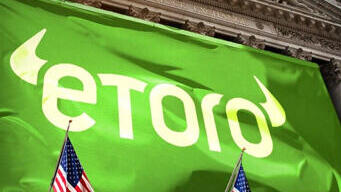Israeli fintech unicorn eToro is moving forward with its long-delayed initial public offering in New York, after pausing the process last month due to high market volatility. The company is now set to raise more than $200 million at a valuation of approximately $4 billion.
eToro initially missed the 2021 IPO window due to regulatory concerns around cryptocurrencies. It renewed its push following the U.S. elections, encouraged by President Donald Trump’s pro-crypto stance. But the company postponed again in April after Trump’s tariff announcements triggered renewed instability on Wall Street.
Now, following a weekend rebound that wiped out the "Trump tariff" losses from U.S. markets, eToro has filed its final prospectus. The IPO aims to raise $217 million with shares priced between $46 and $50 each. Additionally, there will be a large secondary offering of shares from existing investors totaling about $250 million, bringing total proceeds to around half a billion dollars.
The offering reflects a valuation of roughly $4 billion at the mid-point. The IPO is being led by Goldman Sachs, Jefferies, UBS, and Citigroup. If successful, eToro will trade under the ticker symbol ETOR.
Among those selling shares are notable shareholders including Israeli Economy Minister Nir Barkat. The filing reveals a significant holding by BRM Group, the investment firm he co-founded with Eli and Yuval Rechavi and Omri Mann. BRM owns 8.4% of Class A shares and 9% of Class B, giving it 8.95% of voting rights—equivalent to around $400 million based on the IPO pricing. Barkat and his partners are set to sell 419,000 shares, which would bring them $20 million.
The holdings of brothers Nir and Eli Barkat are roughly equal to those of eToro CEO and co-founder Yoni Assia, who holds 9.6% of the voting rights and plans to sell 549,000 shares. Hedva Ber, former Supervisor of Banks in Israel and now a senior executive at eToro, owns 63,000 shares and will sell 1,500.
Yoni’s brother and eToro co-founder Ronen Assia, who left the company and is now a partner at investment firm Team8, owns 3.5% of the voting rights and will sell 250,000 shares. Their father, David Assia, a software pioneer and co-founder of Magic Software, holds 1.4% of eToro shares and will sell 65,000. The family’s holdings also include a 1% stake by the VC fund iAngels, co-founded by Mor Assia (Yoni’s wife) and Shelly Hod Moyal.
Other selling shareholders include eToro board member Avner Stepak (8,500 shares) and attorney Hanina Brandes, who holds 1.2% and is selling 86,700 shares.
One unexpected shareholder revealed in the filing is SBT Venture, which owns 6.5% of Class A shares. This is the venture capital arm of Russian bank Sberbank, which has been under international sanctions since 2022. As a result, it has no voting rights and cannot sell its shares in the IPO, though it was originally slated to receive a larger allocation of Class B shares.
Back in 2021, eToro planned to go public at the peak of the SPAC boom through a merger with a blank-check company at a $10.3 billion valuation. As regulatory pressure mounted and the bubble deflated, the company scaled back its expectations, aiming for an $8 billion valuation before ultimately shelving the IPO. It remained private, raising funds at a $3.5 billion valuation while waiting for a better market window—now seemingly open.
Beyond Trump’s deregulatory approach to crypto, eToro is also benefiting from the resurgence of its main rival, Robinhood, which went public in the previous cycle and is now trading at a $43 billion valuation after a 30% rally since the start of 2025.
That valuation reflects a price-to-earnings ratio of 28. Based on eToro’s $192 million in net income for 2024, a comparable multiple would justify a valuation north of $5 billion. Ironically, the company is now in a better position financially to support an $8–$10 billion valuation than it was during the earlier bubble. But the traditional IPO route requires companies to “leave money on the table” for investors—thus, the more modest valuation.
eToro’s biggest strength—and risk—lies in its exposure to the crypto market. Though marketed as a stock and securities trading platform, the company’s fortunes are tightly tied to crypto assets like Bitcoin. Revenue from traditional securities trading—stocks, currencies, and commodities—has remained steady but not growing. That segment brought in $328 million in 2024, up from $305 million in 2023 but down from $393 million in 2022.
The standout growth is in crypto trading volume, which tripled in 2024 to $12 billion, compared to $4 billion in 2023 and $6 billion in 2022. The bottom line: eToro posted $192 million in net income in 2024, up from $15 million in 2023, and a $215 million loss in 2022. Total trading fee revenue hit $931 million last year, a 46% increase over 2023.
As of now, eToro has 3.5 million funded trading accounts (excluding users who only track portfolios or mimic other investors without real funds). In comparison, Robinhood had 25 million active accounts in 2024. By this measure too, eToro’s $4.5 billion valuation appears proportional relative to its American competitor.
While Robinhood dominates among young U.S. traders, eToro holds a stronger position globally.



